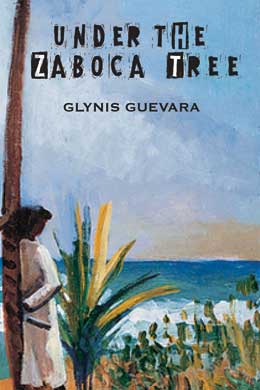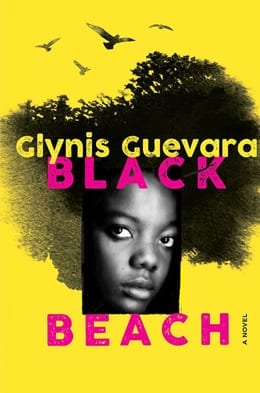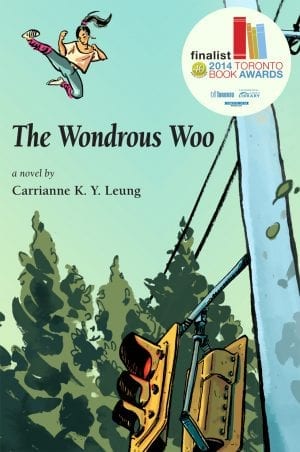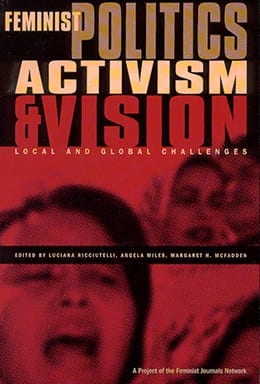“I got to talk to yuh in private.” Petal tapped Dad’s hand the moment he returned. She glanced at Boyie. “Throw an eye on de kids fer me.”
Boyie mumbled his response while continuing to fiddle with a bunch of CDs placed on top of the stereo system’s mahogany stand. Petal headed toward the corridor. My father lifted his suitcase and followed her, leaving me standing there awkwardly, a few feet from Boyie. The room fell completely silent for about thirty seconds while Boyie changed cds. Soon the music was as loud as before and he began to mouth the words to a 50 Cent song. As the minutes ticked by, I wasn’t sure whether to remain standing or to sit on the sofa. The noise began to hurt my ears, but Petal’s boys didn’t seem at all fazed by it. I was too scared to ask Boyie to turn the music down, so I walked onto the porch and counted the birds as they flew by, hoping Dad and Petal would return soon.
From a distance, a man’s grainy voice shouted, “Number ten play, monkey play!” He raised his voice as if to ensure that the entire neighbourhood would hear him. I shifted position several times until I saw the man. He had a shiny, bald head, a square jaw, and a cropped beard. To my surprise, he stopped in front of Petal’s gate.
“Tell Boyie, number ten play!” he said, looking at me. “Then tell him to come and get his money.”
I turned and instantly collided with Boyie, who’d stumbled out to the porch and down the stairs.
“Your number come. Ten play today!” the man said to Boyie. Boyie’s eyes gleamed; he made a fist and pumped his right arm up and down. He rushed toward the fence and the man dug into his pocket, pulled out a stack of bills, and handed them over. Boyie counted the pile, after which he shoved it into his pocket and made his way back inside the house.
“Number ten play. Monkey play!” The man continued up the hill, shouting even louder than before. He swung around the bend so I could no longer see him, but I was still able to hear his voice clearly. It eventually faded as well.
As I lingered on the porch, a girl dressed in white, an older man carrying a small child, a woman clutching a big cardboard box, a little girl dressed to the nines, an old man with one leg shorter than the other, and two boys and a woman lugging large buckets of water on their heads passed by Petal’s gate. Most of them made their way uphill, but a few stepped down the trail.
Suddenly, a man wearing a sleeveless, white t-shirt with arms as thick as a body builder’s rattled the iron gate. His eyes landed on my face. “Tell Boyie I have something fer him,” he said. I pulled back the curtains draping the front door and peeked at Boyie as he fiddled with his music system.
“Somebody at the gate is asking for you,” I said as he dusted the stereo with a soft cloth. I thought I’d spoken loudly enough, over the din of the music, but he didn’t respond. I wondered if the loud music had already cost him a sizeable amount of his hearing.
“Someone by the gate is asking for you!” I shouted this time. Suddenly Boyie brushed past me.
“Come, I have the thing, man,” the muscular man said to him.
“Oswald, I coming.” Boyie made his way down the staircase and unlatched the gate. Boyie pulled out the stack of money he’d shoved in his pocket earlier. He counted one, two, three, four, five, six bills and handed them over. Oswald slipped a tiny package wrapped in brown paper to Boyie, who shoved the parcel into the opposite pocket. Boyie then shut the gate behind him, and headed down the trail alongside his friend.
Even after Boyie had left, I remained on the porch and continued my examination of the neighbourhood. The white duplex to my left, built on as high an incline as Petal’s house, was shut tight, but I could still see some of its white walls through a drape-less window.
A portion of the roof covering the brown house to my right, which stood on a lower level than Petal’s, was somewhat visible, but an ugly aluminum wall, way taller than any human I’d ever met, obstructed a wider view of the dwelling. It wasn’t until I climbed on top of one of the chairs on the porch that I was able to spot a small dingy window with a piece of plywood nailed over it.
I lifted one leg, lowering my body to the ground, but the chair shifted, making a grating sound. My arms flapped around as I tried to keep my balance. Luckily, my two feet landed safely on the ground.
“What yuh doing?” Petal’s older boy looked at me strangely, but moments later he smiled genially.
“Yuh wanna play a game?” Warren took my hand even before I’d responded. “I have a police car, a fireman truck, and a firehouse too.”
Just then his baby brother, Drew, ran toward us. The two boys romped around the chairs. Drew tripped, banging his head on the floor. He bawled and I tried to quiet him, but I couldn’t. Petal, now wearing a bright red polka-dot sundress with two large, square pockets, dashed toward us.
“What happening here?” She scooped up her younger boy and rubbed his head in a circular motion. But the young boy closed his eyes and hollered even louder. “Where Boyie?” Petal asked.
“He left.”
“Gawd man!” she said. “He couldn’t wait a lil’ bit?”
Petal shifted her son from one arm to the next and made her way toward the living room. Suddenly the music stopped.
“You’re enjoying the lovely view?” My father stepped onto the porch, dressed in a short khaki pants and cream sleeveless top. “I bet you’ve never seen so many birds and trees on Paradise Lane. It’s nicer here, isn’t it?”
“I don’t like it here!” I hissed. I kept my eyes to the ground, but still felt his stare.
“You’ll get used to it in no time, just as you got used to Paradise Lane.” He inched closer.
“I don’t want to live on a big hill,” I said.
“You’ve got to behave like a big girl, not a little child.” Dad plunked himself down on the bottom of the staircase and lit a cigarette.
After he’d finished smoking, Dad went back to the car to collect the rest of our baggage. A few minutes after he left, I heard a loud bell ring. I looked up and noticed the big square clock on the wall. It was exactly six o’clock. I couldn’t tell where it was coming from. Who was ringing this bell so loudly, and why? I climbed up on the same chair I’d almost fallen off earlier, but I made sure to be more careful. I craned my neck and peered over the old, rusted aluminum fence, but I couldn’t see anyone, so I swiftly climbed down.
“Yuh hear de bell?” Petal asked as she came toward the porch. I nodded.
“Who’s ringing it?” I asked.
“Is de neighbour, Mr. Arthur. He does ring dat old bell at six o’clock every morning and in de evening too.”
“Why?”
“He ringing it since I was a lil’ girl,” Petal smiled. She rushed toward her younger son, who had once again started to cry. She tucked him into her hip, and he stuck his thumb in his mouth while pressing his cheek against her chest.
My legs and arms started to itch. I rubbed all over to ease the itch and noticed that several big blotches had suddenly appeared on my skin. “Ouch,” I said, as the irritation spread to another spot.
“The mosquitoes eating yuh?” Petal examined the red, swollen areas. “I going and get something fer yuh to put on it.” She returned with a long, thin tube. “Put it all over yuh skin. It going to stop de stinging,” she said. “Is de nasty Carlin and dem up de hill causing so much shitting mosquitoes in dis village.”
After I’d rubbed the ointment all over my limbs and the itchiness stopped, Petal walked ahead, carrying Drew while Warren trailed me. We entered a bedroom with two tiny windows and two single beds. The bed to my right was covered with Superman sheets. The one to my left had ordinary white sheets. Two big boxes overflowing with children’s toys stood beside the left bed.
“Yuh going to sleep here,” Petal said and stepped toward the bed with the white sheets.
“Dis is my big bed,” Warren said.
“Is Baby Girl bed now. Yuh have another big boy bed at yuh father and granny house.” Petal dragged the white sheets from the bed and replaced them with pink flowered ones.
“Put yuh clothes in dere.” She shoved a bunch of hangers overflowing with the boy’s clothes to one side of a tiny wardrobe, making room for my clothes on the other.
“Yuh father going to have to get a desk fer yuh to do yuh homework on,” she said and walked out of the room with her two sons following closely behind her.
***
Flat Hill Village, with its shabby yards, unruly trees, and assortment of odd individuals, compared to Paradise Lane, with its regular hardworking folks and neatly kept trees and flower gardens decorating the front of each house, was hard for me to take in. I sat on the bed and stared at the walls, wishing I had the magical power to make my absent mother reappear. Just then a gecko about five inches long scurried from one edge of the ceiling to the next. I rubbed my palms together as if I were lathering soap all over them. I was too shell-shocked to holler.









inannaadmin –
Under the Zaboca Tree by Glynis Guevara
reviewed by Ann Ketcheson
CM Magazine Volume XXIV Number 24 – February 23, 2018
http://umanitoba.ca/cm/vol24/no24/underthezabocatree.html
Grades 5-8 / Ages 10-13
Excerpt:
“Watch your step!” Dad did a jig to prevent his feet from stepping in fresh dog poop. The higher we climbed, the more dogs’ feces we saw, but most of them were stale and had almost dried up. I played hopscotch, wary in my movements. The music grew louder the further up the hill we went.
We walked past a tidy blue and white duplex with a low wooden fence surrounding its well kept lawn. I thought it was out of place, and then I wondered who lived there.
My father finally stopped in front of a cream coloured dwelling, much smaller than the blue and white house we’d passed moments earlier. It was the house the music was coming from; inside, someone was blasting Rihanna’s umbrella song at full force.
My legs were tired now, and sticky perspiration trickled down my armpits and the length of my back. With my face tilted downward and my back slightly curved, I clutched the fence, panting.
“Hello!” my dad hollered above the music.
I thought we’d have to remain outside forever, or at least until the music stopped, since it seemed unlikely anyone would hear Dad’s voice above the noise. As we waited, the leaves on several hugs trees in front of the house swayed in a powerful current of air, and for a moment the staircase of the house, which was painted a bright red, came into view. In spite of the large trees, the well kept yard was a welcome sight.
A river of wobbly, erratic butterflies fluttered aimlessly around us. I had never before seen such an abundance of colourful creatures in one location. Some of them dipped forward and landed on the flowerbed behind the fence.
A petite woman dragging a flimsy pair of flip flops inched toward us. Her hands swayed to and fro as she balanced a white plastic container filled with what I assumed was water, even though she wasn’t one of the women I’d seen earlier at the standpipe. I was amazed as she approached us without losing a single drop from the container she was carrying on her head.
“Good to see yuh, man,” she said. “Yuh waiting for Boyie to open the gate?”
“Yeah.” Dad gave her a weak smile.
Melody Sparks, aka Baby Girl, moves with her dad to Trinidad when she is just 10-years-old. Her mother has never been part of her life, and Baby Girl would love to solve the mystery of who she is and why she left the family. From Toronto, Baby Girl finds herself first in Paradise Lane, Trinidad, and then later in Flat Hill Village as her father finally finds a home for the two of them. Baby Girl has to constantly adjust to a new country and various new neighbourhoods within it, but fortunately she finds friends and mentors to give her support as she deals with these upheavals in her life.
In this first novel, Glynis Guevara gives her readers an interesting and likeable main character. Baby Girl, at only 10-years-old, has no control over the decisions regarding where she and her dad will live. She deals with loneliness and confusion as she moves here and there, often sharing space with children whom she has barely met. She must continually change and adapt to different people around her as well as to the unique culture of Trinidad. Baby Girl must somehow reconcile her dream of life in Trinidad with the reality that confronts her. As well, she is under the constant stress of wondering just who her mother might be and why she has never made an effort to find Baby Girl and become part of the family once again. Baby Girl has a strong personality which helps her to see the positives in the people around her and makes her willing to persevere despite sometimes overwhelming odds. She becomes more mature and self assured throughout this coming-of-age story.
Guevara seems to have a cast of thousands in the background, with neighbours and children often seeming almost interchangeable. Smokey and Petal, Baby Girl’s dad and stepmother, are two of the consistent characters in the book. While both have their flaws, their desire for Baby Girl to have a safe and happy life is clear. Other notable characters include Arlie, a strong minded woman in Flat Hill Village who is an activist determined to improve the living conditions of those around her. Colm is a young man who briefly lives with the family and who inspires and encourages Baby Girl to put her emotions on paper in the form of poetry and even to compete in poetry competitions.
The plot twists and turns in a somewhat chaotic fashion, rather like real life for Baby Girl. There are moments of violence and absolute terror which are balanced by kindness and efforts at community improvement. The women often take the lead in the story, providing great role models for Baby Girl and other young women. Occasionally the plot seems slow and jumps from one event to another without much preparation for the reader. The author attempts to mimic a Trinidadian way of speaking. The writing style seems rather laboured or forced at times. These are only small concerns and do not undermine the overall essence and excellence of this young adult novel.
The author was born in Barataria, Trinidad and Tobago, and her love and enthusiasm for this part of the world come through clearly in the novel. Readers appreciate the colours, sounds and smells of a Trinidad which is far from the resorts and beaches seen in travel brochures. It is refreshing to have even a small glimpse of the authentic Trinidad and its people as seen through the eyes of a native.
Apparently a second novel is forthcoming, and readers may be able to follow Baby Girl as she continues to grow and mature. Certainly the author leaves questions at the end of Under the Zaboca Tree which fans would love to pursue in further books.
Highly Recommended.
Ann Ketcheson, a retired high school teacher librarian and teacher of English and French, lives in Ottawa, ON.
inannaadmin –
Under the Zaboca Tree by Glynis Guevara
reviewed by Katya Schapiro, Brooklyn Public Library
School Library Journal – December 12, 2017
http://www.slj.com/2017/11/reviews/books/middle-grade-new-titles-frances-hardinge-mariko-tamaki-november-2017-xpress-reviews/#_
Guevara’s debut novel is an ambitious story of family, community, and individuality. Told through the eyes of Melody (Baby Girl) Sparks, who moves from Toronto to Trinidad with her dad, Smokey, at age 10, her story is one of a young woman coping with a series of changes while trying to assert herself as an emerging person. From the Toronto airport to fancy Paradise Lane to the poorer community of Flat Hill Village, Baby Girl has little control over the circumstances of her life, but she’s able to find a place for herself in each situation and to see the people around her in all their complexity. The book is full of memorable characters, especially Smokey and Petal, Baby Girl’s stepmother, and neighborhood community organizer Arlie. The plot moves as chaotically, if not swiftly, as real life—with abrupt turns of violence, discovery, and generosity. The quality of the writing doesn’t match the storytelling. Sudden transitions, cliched descriptions, and a flat, stilted style keep readers at a distance from the narrative, although this is mitigated by passages with more dialogue that flow naturally. VERDICT An interesting and unusual story, worth the purchase in spite of some style flaws.
inannaadmin –
Under the Zaboca Tree by Glynis Guevara
reviewed by The Miramichi Reader – July 31, 2017
http://www.miramichireader.ca/2017/07/under-zaboca-tree/
Under the Zaboca Tree (2017, Inanna Publications) is a Young Adult (YA) book that tells the story of Baby Girl (Melody) Sparks, and her trip to Trinidad and Tobago with her father Smokey (Nicholas) who has sole custody of her. They are leaving Canada to start life anew in Trinidad; her father had separated from her stepmother. Baby Girl has never known her mother and Smokey is not very forthcoming on past family history. Once back in Trinidad, there are many things new to Baby Girl: the island slang, food, new people and new friends to make. Then there is her father’s new girlfriend Vena with whom they live with on Paradise Lane. A swift end to that relationship lands them in Flat Hill Village, a less than desirable area where the cycle of being surrounded by new people plus a high crime rate are unsettling to the young girl.
“Flat Hill Village, with its shabby yards, unruly trees and assortment of odd indiviuals, compared to Paradise Lane, with its regular hardworking folks and neatly kept trees and flower gardens decorating the front of each house, was hard for me to take in. I sat on the bed and stared at the walls, wishing I had the magical power to make my absent mother reappear. Just then a gecko about five inches long scurried from one edge of the ceiling to the next. I was too shell shocked to holler.”
All throughout Under the Zaboca Tree, we feel Baby Girl’s distress, confusion, loneliness and hurt as she gets moved from place to place, and yearns to have a mother like other children. While fortunate to have a father who has cared for her until this point, questions about why her birth mother has never contacted her remain a mystery. Then, one day, an accidental discovery of papers in the bottom of an old desk drawer leads her to confront her father for the truth. A delightful, four-star YA read that is insightful to life in Trinidad & Tobago as well as comprehending the stress transient parents can put on their kids as seen through a child’s eyes.
inannaadmin –
Under the Zaboca Tree by Glynis Guevara
reviewed by Zachary Chauvin
Resource Links Vol 23. No. 3 – February 2018
Melody Sparks, commonly referred to as Baby Girl, is caught in the throes of a tumultuous childhood. She has not seen or heard from her mother and is being raised by an absent father who leads an unstable life. In her book, Under the Zaboca Tree, Glynis Guevara begins with Baby Girl being uprooted from her home in Toronto to live on the island of Trinidad with her father. At first their new living situation seems fine, as she becomes good friends with two children her own age and they live in a relatively safe area called Paradise Lane. But after her father engages in some promiscuous behaviour and thereby completely ruins their welcome, they are forced to move to the crime-ridden slums of Flat Hill Village.
In Flat Hill Village a wide range of eccentric characters cross paths with Baby Girl. The book has a dizzying amount of characters who pop in and out of her life. One might think this would leave the reader slightly disorientated but it actually lends itself well to the idea that the main character is living a hectic life, with no centre or sense of stability. This further emphasizes the sheer lack of responsibility exhibited by her father who seems to float on the margins throughout. But Baby Girl does not need the help of her father in order to gain a foothold within the chaotic social scene, as she befriends many and even helps establish an activist group named the Women’s Action Committee. The committee attempts to bring about positive change at the community level by addressing fundamental problems affected by insufficient roads and a poor water supply. Baby Girl also embraces poetry as a way to express herself and address the feelings she holds for the mother she never knew.
Under the Zaboca Tree is a good read, and demonstrates really well how a childhood experienced under the tutelage of an ill-equipped single parent may inflict irreparable damage. The bad influences and violence that lurks within the slums of Flat Hill Village tempt the most desperate and expose the most vulnerable to harm and dysfunction. What Guevara offers in the character of Baby Girl is an excellent example of someone who recognizes the most troubling aspects of the neighbourhood and properly navigates around the danger it presents. Along the way she understands which people in her community wish to turn things around and works with them to implement change. Most importantly, as a young girl embroiled in this hardship she manages to keep a steadfast composure and learns to appreciate the warmth exuded by the residents of Flat Hill Village, eventually coming to the realization that, “The people of Flat Hill Village had become a part of me”.
Thematic Links: Trinidad; Village Life; Identity; Crime; Poverty